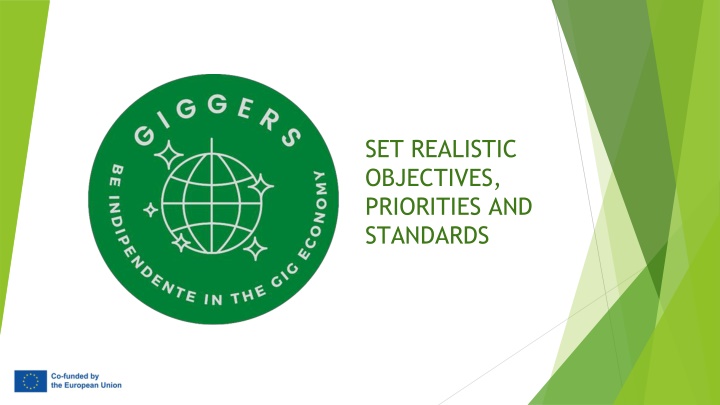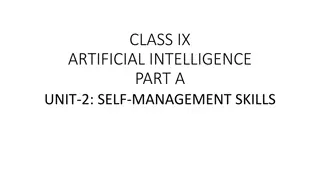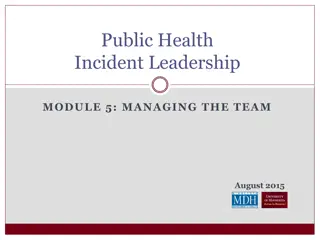Effective Self-Management: Setting Realistic Objectives, Prioritizing Tasks, and Establishing Standards
Setting realistic objectives involves defining SMART goals, prioritizing tasks helps allocate resources effectively, and setting standards maintains consistency and quality. These practices are essential for effective self-management and goal achievement.
Download Presentation

Please find below an Image/Link to download the presentation.
The content on the website is provided AS IS for your information and personal use only. It may not be sold, licensed, or shared on other websites without obtaining consent from the author.If you encounter any issues during the download, it is possible that the publisher has removed the file from their server.
You are allowed to download the files provided on this website for personal or commercial use, subject to the condition that they are used lawfully. All files are the property of their respective owners.
The content on the website is provided AS IS for your information and personal use only. It may not be sold, licensed, or shared on other websites without obtaining consent from the author.
E N D
Presentation Transcript
SET REALISTIC OBJECTIVES, PRIORITIES AND STANDARDS
Setting realistic objectives, priorities, and standards is essential for effective self-management. Here is a description of each: Setting Realistic Objectives: This involves defining specific, measurable, attainable, relevant, and time- bound (SMART) objectives for yourself. Realistic objectives are those that are within your capabilities and resources. They should consider your strengths, weaknesses, and available opportunities. By setting realistic objectives, you can focus your efforts and track your progress effectively. For example, if you want to improve your time management skills, setting a realistic objective could be to complete all tasks on your to-do list by the end of each day for the next month.
Prioritizing: Prioritizing involves determining the importance and urgency of tasks or goals. It helps you allocate your time, energy, and resources to the most important activities. Prioritizing prevents you from being overwhelmed and allows you to focus on what matters most in a given situation. It requires evaluating tasks based on their potential impact and aligning them with your objectives. For instance, if you have multiple deadlines approaching, prioritizing can help you identify which tasks need immediate attention and which can be addressed later.
Setting Standards: Setting standards involves establishing expectations and guidelines for yourself. It provides a benchmark against which you can assess your performance and progress. Standards can be personal, professional, or based on specific criteria. They help maintain consistency, quality, and accountability in your actions and decisions. For instance, if you have a standard of always delivering work of the highest quality, you will consistently strive for excellence in your projects.
In summary, setting realistic objectives, prioritizing tasks, and setting standards are crucial components of self- management. These practices enable you to focus your efforts, allocate resources effectively, and continually monitor and measure your progress towards achieving your goals.
"The European Commission's support for the production of this publication does not constitute an endorsement of the contents, which reflect the views only of the authors, and the Commission cannot be held responsible for any use which may be made of the information contained thereinProject Number: 2022-1-DE-KA220-ADU-000086609






















